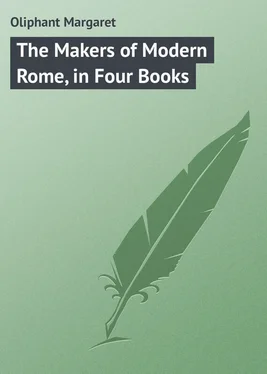Margaret Oliphant - The Makers of Modern Rome, in Four Books
Здесь есть возможность читать онлайн «Margaret Oliphant - The Makers of Modern Rome, in Four Books» — ознакомительный отрывок электронной книги совершенно бесплатно, а после прочтения отрывка купить полную версию. В некоторых случаях можно слушать аудио, скачать через торрент в формате fb2 и присутствует краткое содержание. Жанр: foreign_prose, на английском языке. Описание произведения, (предисловие) а так же отзывы посетителей доступны на портале библиотеки ЛибКат.
- Название:The Makers of Modern Rome, in Four Books
- Автор:
- Жанр:
- Год:неизвестен
- ISBN:нет данных
- Рейтинг книги:5 / 5. Голосов: 1
-
Избранное:Добавить в избранное
- Отзывы:
-
Ваша оценка:
- 100
- 1
- 2
- 3
- 4
- 5
The Makers of Modern Rome, in Four Books: краткое содержание, описание и аннотация
Предлагаем к чтению аннотацию, описание, краткое содержание или предисловие (зависит от того, что написал сам автор книги «The Makers of Modern Rome, in Four Books»). Если вы не нашли необходимую информацию о книге — напишите в комментариях, мы постараемся отыскать её.
The Makers of Modern Rome, in Four Books — читать онлайн ознакомительный отрывок
Ниже представлен текст книги, разбитый по страницам. Система сохранения места последней прочитанной страницы, позволяет с удобством читать онлайн бесплатно книгу «The Makers of Modern Rome, in Four Books», без необходимости каждый раз заново искать на чём Вы остановились. Поставьте закладку, и сможете в любой момент перейти на страницу, на которой закончили чтение.
Интервал:
Закладка:
Similar words upon the happiness of rural life and retirement Jerome had addressed to Marcella before. He had warned her of the danger of the tumultuous sea of life, and how the frail bark, beaten by the waves, ought to seek the shelter of the port before the last hurricane breaks. The image was even more true than he imagined; but it was not of the perils of Rome in the dreadful time of war and siege which was approaching that he spoke, but of the usual dangers of common life to the piety of the recluse. "The port which we offer you, it is the solitude of the fields," he says:
Brown bread, herbs watered by our own hands, and milk, the daintiest of the country, supply our rustic feasts. We have no fear of drowsiness in prayer or heaviness in our readings, on such fare. In summer we seek the shade of our trees; in autumn the mild weather and pure air invite us to rest on a bed of fallen leaves; in spring, when the fields are painted with flowers, we sing our psalms among the birds. When winter comes, with its chills and snows, the wood of the nearest forest supplies our fire. Let Rome keep her tumults, her cruel arena, her mad circus, her luxurious theatres; let the senate of matrons pay its daily visits. It is good for us to cleave to the Lord and to put all our hope in Him.
But Marcella turned a deaf ear to these entreaties. Perhaps she still loved the senate of matrons, the meetings of the Souls, the irruption of gentle visitors, the murmur of all the stories of Rome, and the delicate difficulties of marriage and re-marriage brought to her for advice and guidance. The allusions in both these letters point to such a conclusion, and there is no reason why it should not have been so. The Superior of a convent has in this fashion in much later days fulfilled more important uses than the gentle nun of the fields. At all events this lady remained in her home, her natural place, and continued to pour forth her bounty upon the poor of her native city: which many would agree was perhaps the better, though it certainly was not the safer, way. The death of her mother, which made a change in her life, and might have justified a still greater breaking up of all old customs and ties, was perhaps the occasion of these affectionate arguments; but Marcella would herself be no longer young and in a position much resembling that of a mother in her own person, the trusted friend of many in Rome, and their closest tie to a more spiritual and better life. The light of such a guest as Jerome, attracting all eyes to the house and bringing it within the records of literary history, that sole mode of saving the daily life of a household from oblivion – had indeed died away, leaving life perhaps a little flat and blank, certainly much less agitated and visible to the outer world than when he was pouring forth fire and flame upon every adversary from within the shelter of its peaceful walls. But no other change had happened in the circumstances under which Marcella opened her palace to a few consecrated sisters, and made it a general oratory and place of pious counsel and retreat for the ladies of Rome. The same devout readings, the same singing of psalms (sometimes in the original), the same life of mingled piety and intellectualism must have gone on as before: and other fine ladies perhaps not less interesting than Paula must have sought with their confessions and confidences the ear of the experienced woman, who as Paula says in respect to herself and her daughters, "first carried the sparkle of light to our hearts, and collected us like chickens under your wing." She was the same, "our gentle, our sweet Marcella, sweeter than honey," open to every charity and kindness: not refusing, it would seem, to visit as well as to be visited, and willing to "live the life" without forsaking any ordinary bonds or traditions of existence. There is less to tell of her for this reason, but not perhaps less to praise.
Marcella had her share no doubt in forming the minds of the two younger spirits, vowed from their cradle to the perfect life of virginhood, the second Paula, daughter of Toxotius and his Christian wife; and the younger Melania, daughter also of the son whom his mother had abandoned as an infant. It is a curious answer to the stern virtue which reproaches these two Roman ladies with the cruel desertion of their children, to find that both those children, grown men, permitted or encouraged the vocation of their daughters, and were proud of the saintly renown of the mothers who had left them to their fate. The consecrated daughters however leave only a faint trace as of two spotless catechumens in the story. Incidents of a more exciting character broke now and then the calm of life in the palace on the Aventine. M. Thierry in his life of Jerome gives us perhaps a sketch too entertaining of Fabiola, one of the ladies more or less associated with the house of Marcella, a constant visitor, a penitent by times, an enthusiast in charity, a woman bent on making, or so it seemed, the best of both worlds. She had made early what for want of a better expression we may call a love match, in which she had been bitterly disappointed. That a divorce should follow was both natural and lawful in the opinion of the time, and Fabiola had already formed a new attachment and made haste to marry again. But the second marriage was a disappointment even greater than the first, and this repeated failure seems to have confused and excited her mind to issues by no means clear at first, probably even to herself. She made in the distraction of her life a sudden and unannounced visit to Paula's convent at Bethlehem, where she was a welcome and delightful visitor, carrying with her all the personal news that cannot be put into writing, and the gracious ways of an accomplished woman of the world. She is supposed to have had a private object of her own under this visit of friendship, but the atmosphere and occupations of the place must have overawed Fabiola, and though her object was hidden in an artful web of fiction she was not bold enough to reveal it, either to the stern Jerome or the mild Paula. What she did was to make herself delightful to both in the little society upon which we have so many side-lights, and which doubtless, though so laborious and full of privations, was a very delightful society, none better, with such a man as Jerome, full of intellectual power, and human experience, at its head, and ladies of the highest breeding like Paula and her daughter to regulate its simple habits. We are told of one pretty scene where – amid the talk which no doubt ran upon the happiness of that peaceful life amid the pleasant fields where the favoured shepherds heard the angels' song – there suddenly rose the voice of the new-comer reciting with the most enchanting flattery a certain famous letter which Jerome long before had written to his friend Heliodorus and which had been read in all the convents and passed from hand to hand as a chef d'œuvre of literary beauty and sacred enthusiasm. Fabiola, quick and adroit and emotional, had learned it by heart, and Jerome would have been more than man had he not felt the charm of such flattery.
For a moment the susceptible Roman seems to have felt that she had attained the haven of peace after her disturbed and agitated life. Her hand was full and her heart generous: she spread her charities far and wide among poor pilgrims and poor residents with that undoubting liberality which considered almsgiving as one of the first of Christian duties. But whether the little busy society palled after a time, or whether it was the great scare of the rumour that the Huns were coming that frightened Fabiola, we cannot tell, nor precisely how long her stay was. Her coming and going were at least within the space of two years. She was not made to settle down to the revision of manuscripts like her friends, though she had dipped like them into Hebrew and had a pretty show of knowledge. She would seem to have evidenced this however more by curious and somewhat frivolous questions than by any assistance given in the work which was going on. Nothing could be more kind, more paternal, than Jerome to the little band of women round him. He complains, it is true, that Fabiola sometimes propounded problems and did not wait for an answer, and that occasionally he had to reply that he did not know, when she puzzled him with this rapid stream of inquiry. But it is evident also that he did his best sincerely to satisfy her curiosity as if it had been the sincerest thing in the world. For instance, she was seized with a desire to know the symbolical meaning of the costume of the high priest among the Jews: and to gratify this desire Jerome occupied a whole night in dictating to one of his scribes a little treatise on the subject, which probably the fine lady scarcely took time to read. Nothing can be more characteristic than the indications of this bright and charming visitor, throwing out reflections of all that was going on round her, so brilliant that they seemed better than the reality, fluttering upon the surface of their lives, bringing all under her spell.
Читать дальшеИнтервал:
Закладка:
Похожие книги на «The Makers of Modern Rome, in Four Books»
Представляем Вашему вниманию похожие книги на «The Makers of Modern Rome, in Four Books» списком для выбора. Мы отобрали схожую по названию и смыслу литературу в надежде предоставить читателям больше вариантов отыскать новые, интересные, ещё непрочитанные произведения.
Обсуждение, отзывы о книге «The Makers of Modern Rome, in Four Books» и просто собственные мнения читателей. Оставьте ваши комментарии, напишите, что Вы думаете о произведении, его смысле или главных героях. Укажите что конкретно понравилось, а что нет, и почему Вы так считаете.












